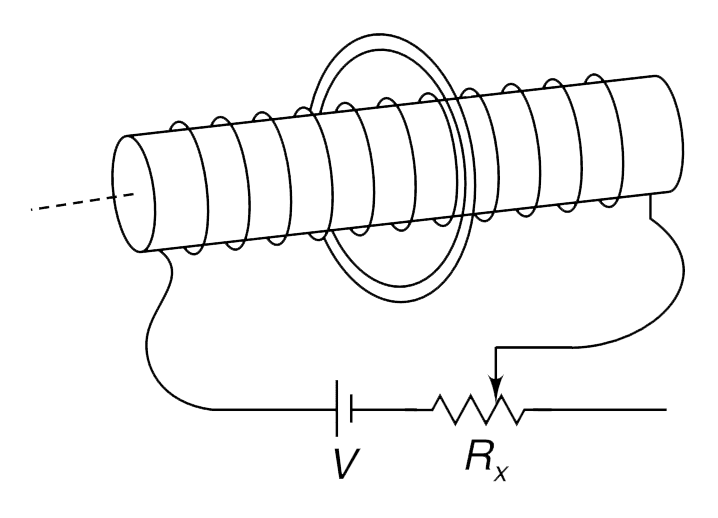The specific charge of an electron is
coulomb
statcoulomb
coulomb/kg
The correct Answer is:C
To find the specific charge of an electron, we need to calculate the ratio of its charge (E) to its mass (M). The specific charge is defined as:
Specific Charge=EM
Step 1: Identify the charge of the electron (E)
The charge of an electron is a known constant:
E=1.6×10−19 C
Step 2: Identify the mass of the electron (M)
The mass of an electron is also a known constant:
M=9.1×10−31 kg
Step 3: Calculate the specific charge
Now, we can substitute the values of E and M into the specific charge formula:
Specific Charge=EM=1.6×10−19 C9.1×10−31 kg
Step 4: Perform the calculation
Calculating the above expression:
Specific Charge=1.69.1×10(−19+31)=1.69.1×1012
Calculating 1.69.1:
1.69.1≈0.1758
Now, multiplying by 1012:
Specific Charge≈0.1758×1012≈1.76×1011 C/kg
Conclusion
Therefore, the specific charge of an electron is approximately:
Specific Charge≈1.76×1011 C/kg
The charge of an electron is a known constant:
E=1.6×10−19 C
The mass of an electron is also a known constant:
M=9.1×10−31 kg
Now, we can substitute the values of E and M into the specific charge formula:
Specific Charge=EM=1.6×10−19 C9.1×10−31 kg
Calculating the above expression:
Specific Charge=1.69.1×10(−19+31)=1.69.1×1012
1.69.1≈0.1758
Specific Charge≈0.1758×1012≈1.76×1011 C/kg
Therefore, the specific charge of an electron is approximately:
Specific Charge≈1.76×1011 C/kg
Topper's Solved these Questions
- ATOMIC PHYSICSBOOK - A2ZCHAPTER - ATOMIC PHYSICSEXERCISE - Bohr'S Hydrogen Model
90 Videos
- ATOMIC PHYSICSBOOK - A2ZCHAPTER - ATOMIC PHYSICSEXERCISE - Atomic Spectrum
53 Videos
- ALTERNATING CURRENTBOOK - A2ZCHAPTER - ALTERNATING CURRENTEXERCISE - Section D - Chapter End Test
30 Videos
- CURRENT ELECTRICITYBOOK - A2ZCHAPTER - CURRENT ELECTRICITYEXERCISE - Section D - Chapter End Test
29 Videos
Similar Questions
If an X-ray tube operates at the voltage of 10kV, find the ratio of the de-broglie wavelength of the incident electrons to the shortest wavelength of X-ray producted. The specific charge of electron is 1.8×1011Ckg.
View SolutionAn X-ray tube operates at the voltage of 40 kV.Find the ratio of the shortest wavelength of X-ray produced to the de-Broglie wavelength of the incident electron. The specific charge of electron is 1.8×1011 C/kg
View Solution
Knowledge Check
Radiation is incident on a photosensitive surface and the stopping potential is found to be 9 V. What is the maximum velocity of the ejected photo electrons if the specific charge of the electron is 1.8×1011 C/kg ?
A6.6×105 m/sB1.8×106 m/sC8×106 m/sD12×105 m/sElectrons move at right angles to a magnetic field of 1.5×10−2 Tesla with a speed of 6×107m/s. If the specific charge of the electron is 1.7×1011C/kg. The radius of the circular path will be
A2.9cmB3.9cmC2.35cmD3cmWhen the speed of electrons increases, then the value of the specific charge on an electron
AincreasesBdecreasesCremains unchangedDnone of these
A long narrow solenoid of radius a has n turns per unit length and resistance of the wire wrapped on it is R. The solenoid is connected to a battery of emf V through a variable resistance Rx. There is a conducting ring of radius 2a held fixed around the solenoid with its axis coinciding with that of the solenoid. The relaxation time of free electrons inside the material of the conducting ring at given temperature is τ and specific charge of an electron is α. The variable resistance Rx is changed linearly with time from zero to R in an interval Δt. Calculate the drift speed of the free electrons in the ring during this interval. [Neglect inductance]

View Solution(a) Estimate the speed with which electrons emitted from a heated emitter of an evacuated tube impinge on the collector maintained at a potential difference of 500 V with respect to the emitter. Ignore the small initial speeds of the electrons. The specific charge of the electron i.e., its e/m is given to be 1.76×1011C kg−1.
(b) Use the same formula you employ in (a) to obtain electron speed for an collector potential of 10 MV. do you see what is wrong ? In what way is the formula to be modified ?
View SolutionA beam of electron enter at right angle to an uniform electric field with a velocitgy 3x107m/s,E=1800v/m while travelling through a distance of 10cm , the beam deflected by 2mm then specific charge of electron is
View SolutionAssertion (A),In the Thomson's e/m experiment of electrons, the specific charge of electrons is independent of natural of the discharge tube
Reason (R ): Charge of a body is quantized
View SolutionIn a straight conductor of uniform cross-section charege q is flowing for time t. Let s be the specific charge of an electron. The momentum of all the free electrons per unit length of the free electrons per unit length of the conductor, due to their drift velocity only is
View Solution
